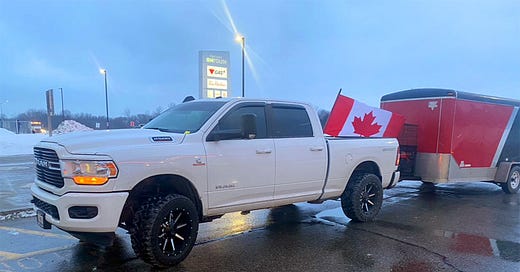Clayton worked as a long haul trucker for six years. "I'd be gone four, five weeks at a time," he says. "Come back home for two days, then go again. Heavy equipment, excavators, buildings. The big stuff that goes down the road, with police escorts. That's what I was doing."
For a change of pace, he got a crane job closer to home. But nine months later, COVID hit and he was laid off. "That's when I started my own business, with a little truck and a little trailer. Doing junk removal. It took off from day one. Everybody was home and in lockdown." People suddenly had time to clean out their basements or do minor renovations. "I was able to pick up a lot of customers and build my business to multiple trucks and trailers," including two full time employees, and several part-time ones.
"When we were in lockdown, I made more money," he says, but "nothing made sense." For example, taxpayers were barred from municipal waste disposal sites near London, Ontario where he resides:
You weren't allowed to go there as a regular citizen, you had to be a business. So people would go there, they'd be denied access, and then they'd call me. I'd drive to the dump, throw their load in my truck, and in I'd go.
His girlfriend at the time couldn't work due to social distancing rules. He saw kids missing out on sports and socialization. Now in his late twenties, in Clayton's view being locked down "mentally messed up" a lot of his friends.
Hearing about the Freedom Convoy early on, his first response was skepticism. "Truck drivers will talk a big game," he says. "But when it comes to sticking together, they don't really. So I was inspired that they were able to come together for once. As I watched it grow and grow, I could only envision how clogged up Ottawa was going to get."
Up to that point, he'd never been to a protest in his life. But "I went up to be a supply truck," he says. "I was concerned that anybody that was parked might not have access to food, water, whatever. So I put an ad on my business page that I was going to fill my pickup and trailer with donations of food, clothing, washer fluid. And I got it about 75% full in three days."
His arm of the Convoy gathered at the Flying J truck stop, just off the 401 on the outskirts of London. The arm that had departed from Windsor, Ontario was meeting them there, but was behind schedule due to the weather. "When we all got on the other side of Toronto, there was the worst snow storm. I didn't know if we were going to make it. It set us back hours."
After spending the night in Kingston, he left early, arriving in downtown Ottawa around 10:30 in the morning on Friday, January 28th with a three-by-five-foot Canadian flag on the back of his truck. "I ended up being one of the first crews there." After circling for a bit, with his options wide open, he chose a parking spot a few blocks west of Parliament Hill on Wellington Street. The Bank of Canada was a little ahead on his right, the Supreme Court was a bit back and to his left. "I didn't know what was going to happen. I wanted to park close enough that I could be part of it, but not too close. If something went wrong, I could still get out."
He laughs, "within half an hour of me being there, a gentleman come up to my window and tried to hand me $50. I told him I didn't need it. He insisted, and I insisted that I wouldn't. And then he actually started taking his clothes off in minus 30 weather, demanding that I take his coat and sweater to stay warm."
Clayton is pretty sure the man was a local, only a few years older than himself. "I said,' No, sir. I'm okay. I'm in a truck.'"
next installment: When Grassroots Became a Groundswell







Donna, this story, of a very resourceful human being is the condensation of the lockdown story. Ordinary Canadians were told to stay home, sit on the couch, there's nothing you can or may do. Your effort will harm others. Politicians and bureaucrats are the only ones that can solve the COVID health disaster.
That our elected official panicked for one and chose to discard the greatest brain pool in the country, the thinking skills of the ordinary citizen, shows graphically how far our society has moved from wisdom.